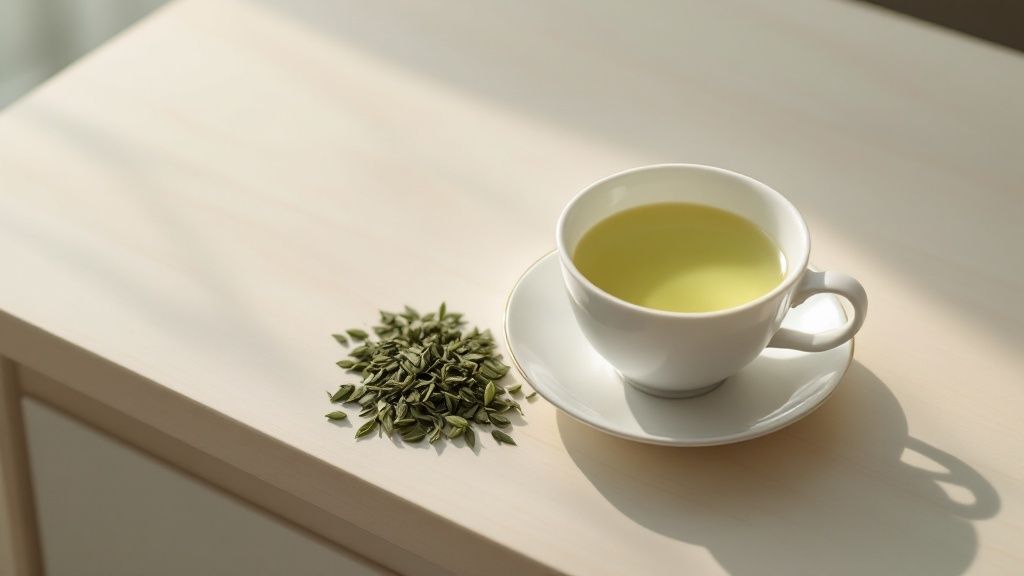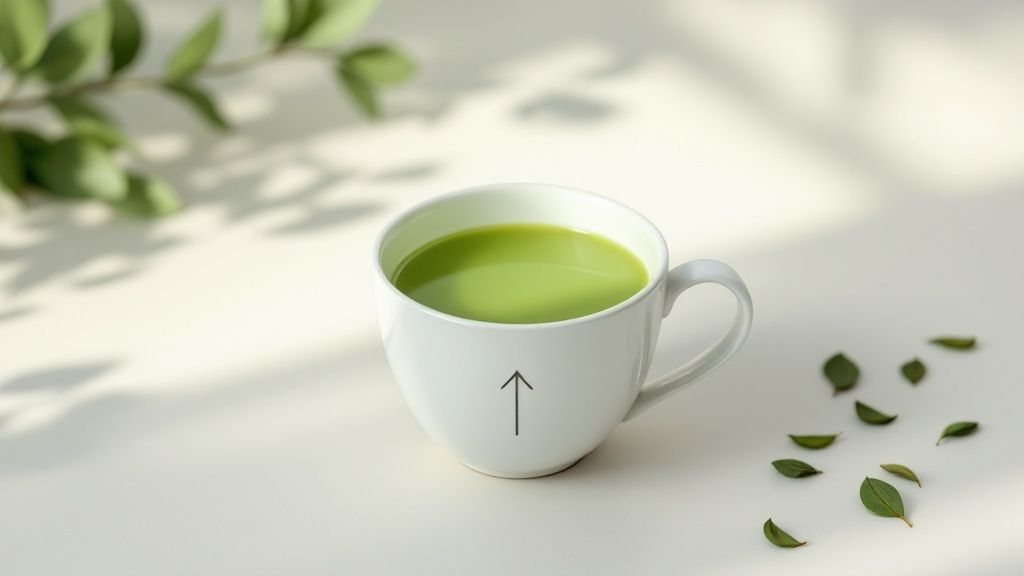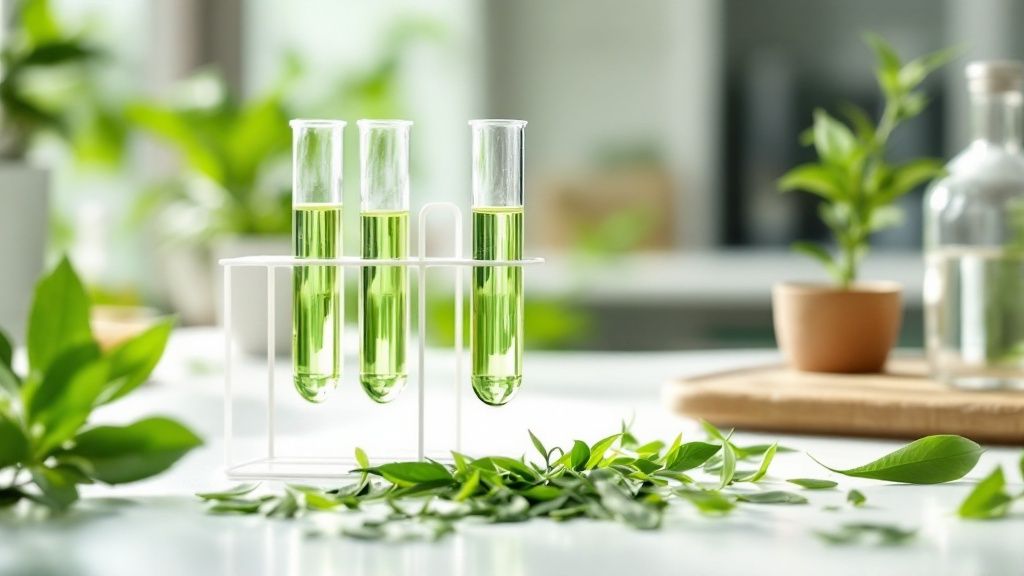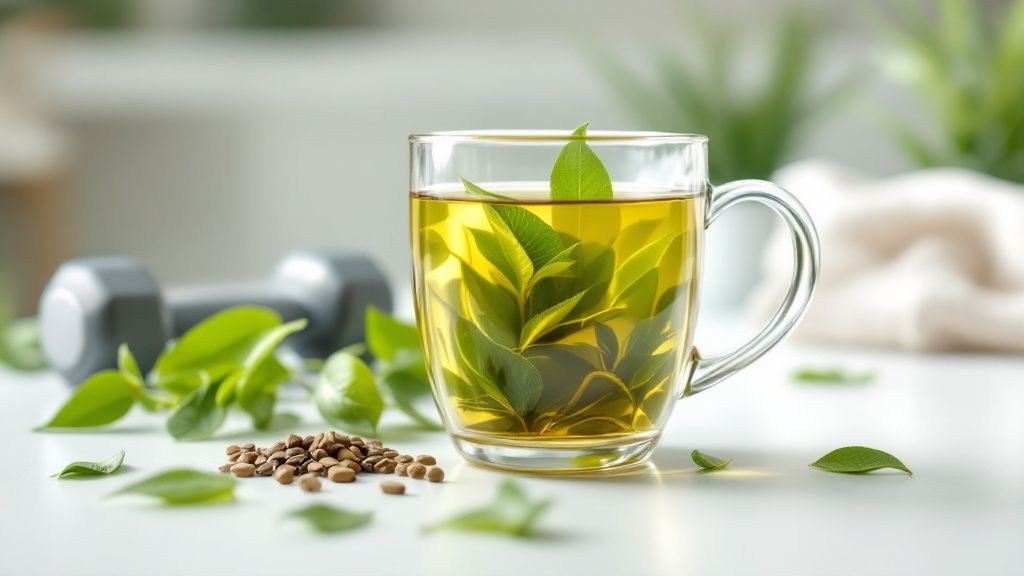So, can green tea really help you lose weight? The short answer is yes, it can. The magic lies in a powerful combination of compounds called catechins and a moderate caffeine content, which work together to gently fire up your metabolism and encourage your body to burn fat.
Your Guide to Green Tea and Weight Management

Green tea has been a cornerstone of cultures around the world for centuries, but its recent explosion in popularity here in the UK has a lot to do with its health credentials. More and more of us are reaching for a cuppa not just for its delicate flavour, but for its well-researched ability to support weight management goals.
But let's be realistic right from the off. Green tea isn't some miracle elixir that will have the pounds falling away overnight. A better way to think of it is as a brilliant teammate on your health journey—a natural, effective support system that works alongside a balanced diet and regular exercise.
A Powerful Ally in Your Health Goals
The real genius of green tea is how it enhances the good work you’re already doing. Its active compounds, especially one called epigallocatechin gallate (EGCG), give your body’s natural fat-burning processes a helpful nudge. When you pair that with mindful eating and staying active, these small boosts can add up to real, sustainable results over time.
This guide is here to demystify how it all works, breaking down the science without the jargon. We'll explore:
- How its unique compounds get your metabolism going.
- The way it helps your body tap into stored fat for energy.
- Simple, practical tips for making it part of your daily routine.
Of course, a healthy diet involves more than just a good cup of tea. For anyone looking for convenient ways to manage hunger, learning how to find the best protein bars for weight loss is another fantastic strategy to have up your sleeve.
Think of green tea as a wellness amplifier. It works best by enhancing the effects of a healthy diet and active lifestyle, not by replacing them.
By the end of this guide, you’ll have a clear picture of the real benefits of green tea for weight loss and feel ready to make this UK wellness favourite a key part of your own success story.
Key Compounds in Green Tea for Weight Loss
To get a better idea of what's going on inside your cup, let's break down the main players responsible for green tea's weight management benefits. These compounds work in synergy to support your body's metabolic processes.
| Compound | Primary Role in Weight Loss | How It Works |
|---|---|---|
| Epigallocatechin gallate (EGCG) | Fat Oxidation | The star of the show. EGCG boosts norepinephrine, a hormone that tells fat cells to break down. |
| Caffeine | Metabolism Boost & Energy | A natural stimulant that increases your metabolic rate and provides a gentle energy lift for workouts. |
| L-Theanine | Reduces Stress & Cravings | An amino acid that promotes calm, which can help curb stress-related eating and sugar cravings. |
Essentially, you have a team of compounds working together: EGCG and caffeine boost fat burning and metabolism, while L-theanine helps you stay on track by managing stress. It's this clever combination that makes green tea such a powerful ally.
How Green Tea Fires Up Your Metabolism

So, how exactly does a simple cup of green tea help with weight loss? It all comes down to your metabolism. Think of it as your body's internal engine, constantly humming away and burning calories to keep everything running. Green tea contains a unique pair of natural compounds that work together to turn the dial up on this engine.
The two key players here are catechins and caffeine. Now, most of us associate caffeine with that morning jolt from a cup of coffee, but its role in green tea is a bit more subtle and sustained. It’s the brilliant synergy between these two that gives green tea its metabolic magic.
The Dynamic Duo: EGCG and Caffeine
The real star of the show among the catechins is a powerhouse called Epigallocatechin Gallate (EGCG). You can think of EGCG as the efficiency manager for your body’s fat-burning systems. Its main job is to inhibit an enzyme that would normally break down norepinephrine, a hormone that plays a massive role in fat metabolism.
When you have more norepinephrine sticking around, your nervous system gets a stronger, clearer signal to break down fat cells. This process, known as lipolysis, frees up stored fat, pushing it into your bloodstream where it can be used for energy. In short, EGCG helps keep that "burn fat" signal switched on for longer.
Now, let's bring caffeine into the picture. Caffeine acts as a gentle stimulant, giving your body a nudge to burn more calories and fat. When you combine it with EGCG, the effect is far greater than either compound could achieve on its own. This teamwork is what makes green tea such a sought-after tool for weight management.
The combination of EGCG and caffeine in green tea boosts the very hormones that tell your fat cells it's time to break down. This encourages your body to tap into its existing fat stores for energy, rather than just relying on the calories you’ve recently eaten.
Kickstarting Your Calorie-Burning Furnace
This metabolic boost has a scientific name: thermogenesis. It’s simply the process of your body producing heat by burning calories. Drinking green tea helps to increase thermogenesis, meaning you burn a few more calories throughout the day—even when you’re just sitting at your desk.
Study after study has shown that people drinking green tea extract see a noticeable increase in their 24-hour energy expenditure. Of course, it’s a modest effect, but consistency is everything. A small but steady increase in your daily calorie burn can really add up over time, making a real difference in managing your weight.
This is what makes green tea a much smarter choice than chugging high-caffeine energy drinks. Its thermogenic effect is stable and sustained, thanks to that clever balancing act between EGCG and a moderate amount of caffeine. You get a gentle metabolic lift without the jitters or the inevitable crash that comes with a strong coffee.
By promoting fat breakdown and stimulating thermogenesis, green tea helps turn your body into a more efficient fat-burning machine. It’s not a magic bullet, but it provides a consistent, science-backed push in the right direction. It’s a foundational tool for supporting your overall health and weight goals.
Boosting Fat Burn and Managing Appetite with Green Tea

While firing up your metabolism is a brilliant start, the story of green tea and weight loss doesn't stop there. Two of its most helpful benefits are how it nudges your body to burn stored fat for fuel and how it can help you feel more in charge of your appetite. These two effects work in perfect harmony with that metabolic boost.
This is where green tea really comes into its own, especially when you pair it with an active lifestyle. Its active compounds, particularly the powerhouse EGCG, are known to promote fat oxidation. That's just the scientific way of saying it helps your body break down stored fat and use it for energy.
Encouraging Your Body to Use Fat for Fuel
Picture your body having two main fuel tanks. One is full of carbohydrates from the food you've recently eaten, and the other is filled with stored fat. Your body, by default, likes to burn the carbs first because they're the easiest energy source to get to. Green tea acts like a clever fuel switcher, encouraging your system to dip into those fat reserves a bit more often.
Studies have shown that drinking green tea can increase the rate of fat burning, not just while you're resting but especially during moderate exercise like a brisk walk or a cycle. It means you’re essentially getting more out of your workouts.
One of the most powerful benefits of green tea for weight loss is its ability to enhance fat oxidation. This means with green tea in your system, your body is more likely to burn its own stored fat for energy when you get moving.
This is why having a cup of green tea before a workout is such a great strategy. It primes your body to tap into those stubborn fat stores, helping to make your exercise session that little bit more effective.
A Subtle Hand in Appetite Control
Alongside boosting fat burn, green tea also plays a subtle but really helpful role in managing appetite. It’s not a magic potion that will make you forget what hunger feels like, but its gentle effects can make a real difference to your daily calorie count.
The compounds in green tea might influence the hormones that tell you you're hungry, like ghrelin (often called the "hunger hormone"). By helping to stabilise these signals, green tea can leave you feeling more satisfied and fuller for longer after you eat.
This gentle regulation can lead to some really positive habits:
- Reduced Snacking: When you feel more satisfied between meals, you're just less likely to reach for those high-calorie snacks.
- Better Portion Control: It can help you feel content with smaller, more sensible portions at mealtimes.
- Fewer Cravings: The calming effect of L-theanine can also help take the edge off stress-related eating, which is a common hurdle for many of us.
It's not about a dramatic diet overhaul, but more about making it easier to stick to a healthy eating plan. Over time, these small tweaks—a few fewer calories here and there—can add up to meaningful and, more importantly, sustainable weight loss.
Choosing the Best Green Tea for Weight Loss

Wandering down the tea aisle can feel a bit overwhelming, can’t it? With so many green teas promising so much, it’s tough to know which one to pick. The truth is, they aren't all created equal, especially if you’re hoping to support your weight loss goals.
How the tea is grown, processed, and even how you brew it makes a huge difference to its concentration of fat-burning catechins like EGCG.
The UK has well and truly caught the green tea bug. Back in 2020, the market was already worth around £29.5 million, and it's the fastest-growing part of a UK tea industry worth over two billion pounds. More choice is brilliant, but it also means it pays to know what you’re looking for.
Matcha: The Catechin Powerhouse
If weight loss is your main focus, then matcha is in a class of its own. With traditional green teas, you steep the leaves and then toss them away. But with matcha, you’re consuming the entire leaf, which has been carefully stone-ground into a vibrant powder.
This means you’re getting a far higher concentration of antioxidants and catechins. Think of it like boiling vegetables and drinking the water versus eating the vegetables themselves – you get all the goodness. A single cup of matcha can pack the nutritional punch of several cups of regular green tea.
By consuming the entire leaf, you get a more potent dose of EGCG and other beneficial compounds, making matcha an incredibly efficient choice for amplifying the green tea weight loss benefits you’re aiming for.
Sencha and Other Leafy Varieties
It’s not just about matcha, though. Other fantastic varieties like Sencha and Bancha bring plenty to the table. Sencha is Japan's most popular green tea, loved for its fresh, delicate flavour. Because the leaves are steamed right after being picked, it holds onto a high level of catechins, making it a brilliant everyday choice for supporting your metabolism.
If you want to dig deeper into the options, guides on the best green tea for weight loss can offer some really helpful comparisons.
Tea Bags vs Loose Leaf
This often boils down to convenience versus quality. While tea bags are undeniably quick and easy, they often contain the tiny, broken bits of tea leaves known as 'dust' or 'fannings'. This can lead to a brew that’s less potent and lower in those all-important catechins.
- Loose-leaf tea usually means you're getting whole leaves, which have more room to expand and release their full flavour and beneficial compounds. It’s a definite step up in quality.
- Pyramid tea bags are a great middle ground, giving the leaves more space to infuse than old-school flat bags.
Whatever you choose, always check the label. You’re looking for 100% green tea. Try to steer clear of products with added sugars or artificial sweeteners, as they just add empty calories and can undermine all your good work. For a proper deep-dive into the different types, have a look at our guide on what is the best green tea.
Weaving Green Tea into Your Daily Rhythm
Getting the most out of green tea isn’t about making big, dramatic changes. It’s all about creating a simple, enjoyable habit that slots easily into your day. Once you get into the swing of it, you’ll find it’s easier than you think. Consistency really is everything.
The trick is to find those little pockets of time where a warm, comforting brew just fits. For many, that’s first thing in the morning – a gentle, jitter-free alternative to coffee that gives you a calm, focused start. For others, a cup in the afternoon is the perfect way to sidestep that 3 pm slump and the temptation to reach for a biscuit.
Finding Your Green Tea Sweet Spot
When you drink your green tea can make a difference. By syncing your cuppas with your body's natural clock and daily activities, you can give its metabolism-boosting properties a little extra nudge.
Here are a couple of ideal moments to put the kettle on:
- Before You Move: A cup of green tea about 30-60 minutes before a workout is a brilliant move. The dream team of EGCG and caffeine can help your body burn more fat for fuel while you exercise. It’s like giving your workout a secret superpower.
- Between Meals: Sipping on a cup mid-morning or mid-afternoon can help keep those snack cravings at bay. It has a subtle way of helping you feel more satisfied, making it easier to sail through to your next meal.
One thing to bear in mind: try to avoid drinking green tea right with your meals. It contains natural compounds called tannins which can get in the way of your body absorbing minerals like iron. Just leaving a small gap is all it takes to get the best of both.
Simple Brews for Maximum Benefits
How you make and drink your tea matters just as much as when. It’s easy to fall into habits that accidentally reduce its goodness, but they’re simple to fix.
First up, give the sugar and milk a miss. Adding sugar just piles on empty calories, which is the exact opposite of what you’re aiming for. What’s more, some studies show that the proteins in dairy milk might latch onto the catechins, making it harder for your body to absorb all that good stuff.
For the best flavour – one that's smooth, not bitter – use water that’s hot but not quite boiling. Around 80°C is the sweet spot. This gentle approach keeps the delicate compounds happy and makes for a much nicer cup. Aiming for two to three cups a day is a fantastic goal, giving your body a steady supply of those powerful catechins without going overboard on caffeine.
Why is Green Tea Suddenly Everywhere in the UK?
Let’s be honest, green tea is having a moment. It's elbowed its way out of the traditional teacup and onto the UK’s modern wellness scene, earning a new reputation as a genuine health ally.
This isn’t just about having a nice brew. People, especially younger generations, are seeking out natural, scientifically-sound ways to look after themselves. They're seeing green tea less as a simple drink and more as a smart addition to their routine, particularly when it comes to goals like managing their weight.
It all points to a bigger shift in how we think about health – moving towards preventing problems rather than just reacting to them. Many are now brewing a cup specifically for those wellness perks that science is starting to back up.
The Great British Tea Shift
Of course, a classic cup of black tea isn't going anywhere. It’s still the nation's favourite, especially for the older generation. But there’s a definite change in the air, and it's being led by younger tea drinkers.
Consider this: while a massive 86% of those aged 65+ stick with their beloved black tea, 20% of 18 to 24-year-olds have already made herbal or green teas a daily habit. That's double the rate of older demographics. You can see the full picture in the UK Tea and Infusions Association's latest report on how Brits take their tea.
The rise of green tea signals a move from comfort drinking to conscious consumption, where every cup serves a purpose in a healthier lifestyle.
This mindful approach has firmly established green tea's new role in the UK. If you're wondering where to start, our guide on the benefits of loose leaf vs tea bags is a fantastic resource.
Your Green Tea Questions, Answered
Alright, so we've covered the science, but what does this all mean for your daily routine? Let's get down to the practical side of things. I get asked these questions all the time, so here are some straight answers to help you get started on the right foot.
How Much Green Tea Should I Actually Be Drinking?
The magic number seems to be somewhere between three to five cups a day. This is the range most studies point to for getting a meaningful dose of those powerful catechins to give your metabolism a gentle push, without going overboard on the caffeine.
Don't try to chug it all at once. Think of it more as a steady rhythm throughout your day. A cup here and a cup there keeps those metabolic benefits ticking along nicely.
Can I Just Drink Green Tea and Skip the Gym?
If only it were that simple! It's much better to think of green tea as a trusty sidekick, not the hero of the story. While it definitely gives your metabolism a nudge, it's not a magic bullet.
The real, lasting green tea weight loss benefits shine brightest when you pair it with a sensible diet and a bit of regular movement. It’s there to boost your efforts, not do the heavy lifting for you. For more on how different brews can support your goals, check out our complete guide to tea for weight loss.
Does a Splash of Milk or a Spoonful of Sugar Spoil It?
In a word, yes. Adding sugar or honey piles on empty calories, which is the exact opposite of what you’re trying to achieve. And what about milk? Well, some studies suggest the proteins in dairy can actually grab onto the catechins, making it harder for your body to absorb all that goodness.
To really get the full, unadulterated benefit from your brew, it's always best to drink your green tea straight. If you find the flavour a little intense, try brewing it for a shorter time or with water that’s not quite boiling—it can make a world of difference to the bitterness.
Is There a "Best" Time to Drink It?
Timing can definitely play a role. Having a cup about 30-60 minutes before you exercise can help your body burn more fat while you’re moving. A cup between meals is also a great way to keep cravings at bay and stop you from reaching for a snack you don't really need.
It seems the younger generation is already onto this. A 2023 Mintel report on British tea habits found that 52% of adults aged 25-34 are regular green tea drinkers, compared to just 34% of the wider population. It’s a clear sign that more and more of us are turning to tea for its wellness perks. You can read more about British tea drinking trends on mintel.com.
Ready to find a brew that supports your wellness journey? Take a look at the premium, whole-leaf green teas at Jeeves & Jericho and discover your new favourite today at https://www.jeevesandjericho.com.


